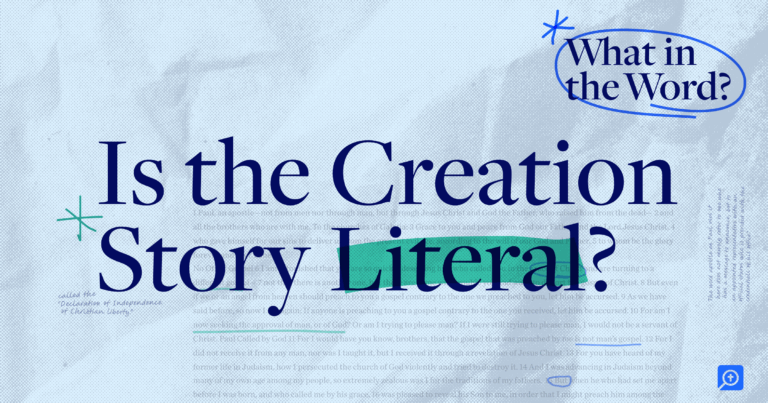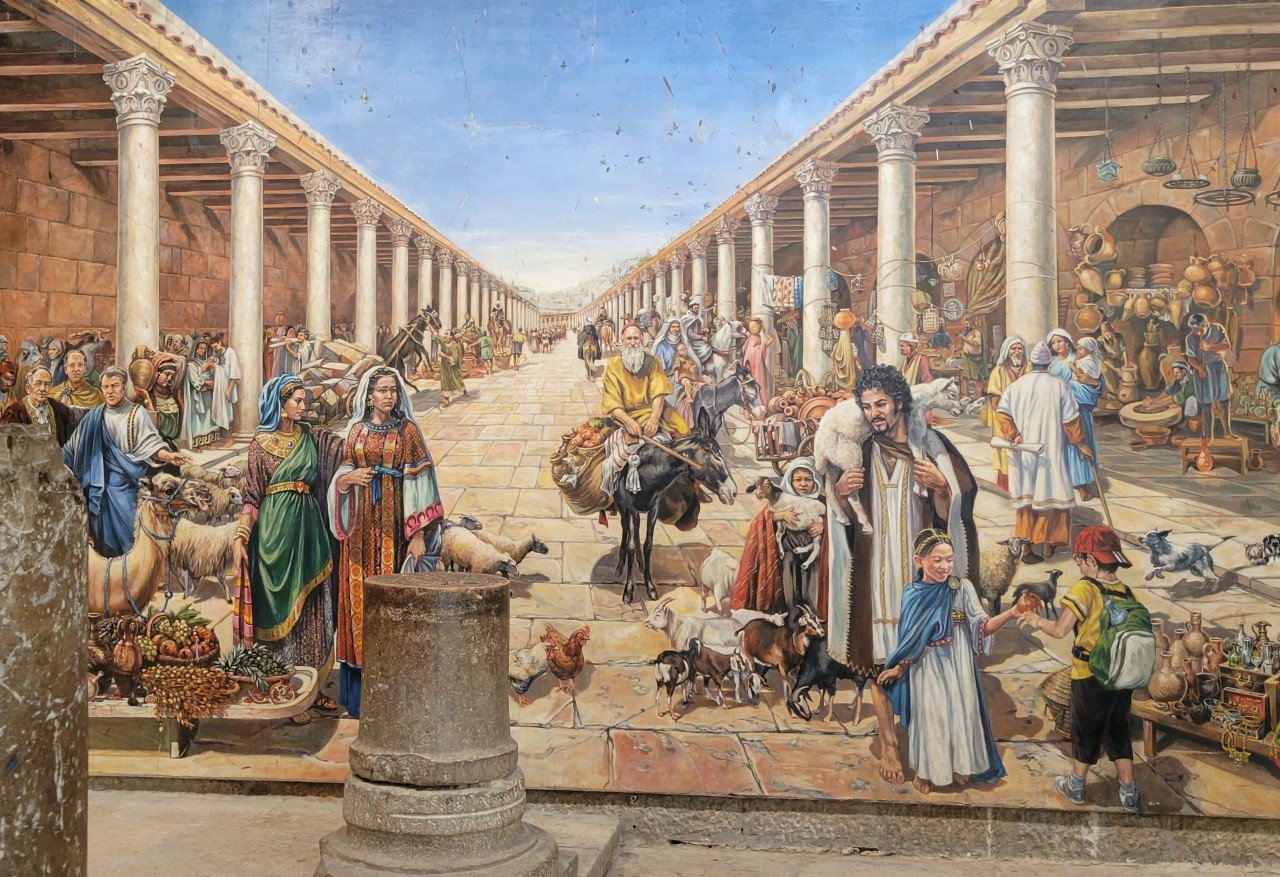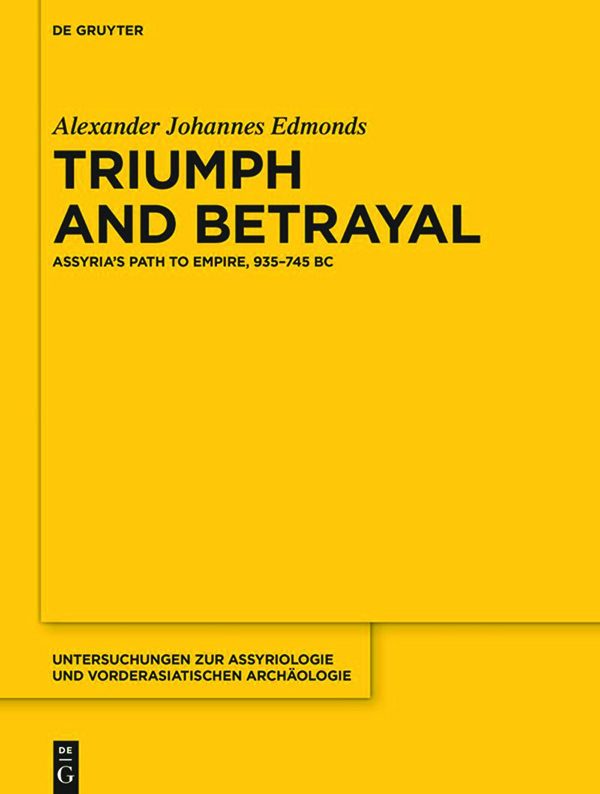
How should we understand the Bible’s Creation story in Genesis 1:1–2:3?
In this episode of What in the Word?, Kirk E. Miller is joined by Vern Poythress to explore the genre, interpretation, and theological intent of Genesis 1:1–2:3. They discuss various interpretive models—such as literal 24-hour days, the literary framework view, day age theory, and more—while addressing questions of history, science, and the meaning of the “days” of creation.
Tune in as we reflect deeply on how Scripture portrays God as the sovereign, wise, and beneficent Creator.
Follow the show on YouTube, Spotify, Apple Podcasts, and more.
What you’ll find
Special offers

A Free Book Just for You
Logos has given away over 5 million free books, empowering Christians globally to study deeply. Get a shiny, new free book every month!
Claim your free book

Exclusive Lexham Press Tough Texts Bundle
Have more questions about the Bible? Get the 10-volume Lexham Press Tough Texts Bundle designed exclusively for fans of What in the Word?
Get the bundle

The Future of Bible Study is Here
Unlock in-depth study of God’s Word, plus exclusive discounts, free books, and more starting as low as $9.99/month—only with the new Logos.
Start a free trial
Connect with us
Ready to increase biblical literacy? Like and share. To go the extra mile, leave us a review on your preferred platform.
Subscribe to get future episodes. (Bonus: We’ll send you a discount to use on your first purchase.)
Thanks for subscribing to Word by Word!
Use code WORDBYWORD to save 10% on your first order.
Episode guest: Vern Poythress
Rev. Dr. Vern Poythress (PhD, Harvard; DTh, Stellenbosch) serves as Distinguished Professor of New Testament, Biblical Interpretation, and Systematic Theology at Westminster Theological Seminary, where he has been teaching for nearly five decades. His work explores the far-reaching implications of Christianity—and particularly the Trinity—for every area of life and thought.
Episode synopsis
Why Genesis 1 is so debated
Only one chapter into Scripture, and we already encounter major debate: How should we understand the creation account in Genesis 1? Does it depict creation in six literal 24-hour days, or is something more literary or symbolic going on?
So what makes Genesis 1 particularly debated? Vern Poythress offers a few reasons.
First, it’s foundational. The passage offers core theological claims about God’s identity as Creator, the goodness of creation, and humanity’s role within it. If this foundational frame is misunderstood, those things which follow in Scripture can be misread.
Second, Genesis 1 stands at the intersection of theology and science. Modern scientific accounts of the origins of the universe often seem to conflict with a straightforward reading of Genesis. For many people, this raises significant questions. How does one reconcile scientific claims with biblical revelation?
Finally, the message of Genesis 1 is not simply informational. It’s formative. It reveals who God is, who we are, and why we exist. It sets the stage for understanding sin, redemption, and the entire Christian story.
The theological and literary context of Genesis 1
To begin the conversation, Vern underscores a foundational conviction: Genesis 1 is the Word of God. It’s part of the canon of Scripture—God’s designed communication to his people throughout history.
As Kirk points out, this passage is also deeply embedded within the flow of Genesis as a whole. Genesis 1 is the overture to a grand narrative: It not only tells of the creation of the world but sets up the fall, the call of Abraham, and the beginning of God’s redemptive work.
Further, Genesis 1 flows directly into Genesis 2, which offers a second, complementary perspective on creation.
Why creation matters for understanding the gospel
The doctrine of creation is important for understanding and supporting to the gospel message. As Vern observed, in contemporary Western culture, many people lack even a basic awareness of God as Creator. So when Christians jump straight to talking about Jesus and salvation, many lack the necessary preconditions for aspects of that message to be intelligible.
Namely, as Kirk explains, we need redemption because we are alienated from God. But to make sense of that, we must first understand who God is—that he is our Creator, the one to whom we owe our existence, allegiance, and worship. Creation establishes our accountability before God and highlights the seriousness of sin. Without this context—without the “bad news”—the “good news” makes little sense. We won’t understand the message of salvation unless we first understand that we are in need of saving.
The various interpretations of Genesis 1
Kirk and Vern next turn to the range of interpretations Christians have held regarding Genesis 1.
They emphasize that disagreement here is not new. As early as the fourth century, Augustine speculated about non-literal readings of the text, and in modern history, Christian scholars have proposed numerous models to make sense of Genesis 1 in light of both biblical theology and scientific knowledge.
Kirk and Vern mention several of the most well-known views:
- The 24-hour day view: This is the most straightforward interpretation—that the six days of creation were six consecutive, ordinary days. This view emphasizes a plain reading of the text and has been popular among many conservative Christians.
- The framework view: This perspective sees Genesis 1 using a literary structure rather than providing a chronological sequence. Days 1–3 form environments, and Days 4–6 fill those environments with inhabitants, after which God rests.

- The day-age view: Here, each “day” represents a long epoch or age. Advocates often point to the flexible use of the Hebrew word for “day” (יוֹם), which can refer to a solar day or a longer period of time, depending on context (see Logos’s Bible Word Study on יוֹם).
- The analogical day view: According to this view, the six days are God’s “work days,” given as a model for our human workweek (see Exod 20:11), but not necessarily corresponding to literal 24-hour human periods. The focus is on the analogy between God’s work and our own, rather than the clock-time duration of each day.
- The mature creation view: This view holds that God created the universe with the appearance of age, just as Adam and Eve were created mature. Critics sometimes see this as deceptive, but as Vern points out, it’s only deceptive if one assumes so.
- The gap theory: This posits an indefinite gap between Genesis 1:1 and 1:2, which could theoretically allow a significant period of time to pass.
- Functional view: John Walton, based on alleged ANE parallel, argues that the point of Genesis 1 is the assignment of roles and functions rather than the origins of the material world.
- Punctuated activity: Here each of the six creation days is seen as 24-hours, but indefinite periods of time exist between each.
- Instantaneous creation: Many across church history, like Augustine, believed that God created everything all at once.
Vern notes that all these views—except those which deny core doctrines—fall within a spectrum of legitimate Christian interpretation.

Use Logos’s Highlights to mark the text, noting structure and repetition.
What is the genre and historicity of Genesis 1?
Vern argues that Genesis 1 is written in nonfiction Hebrew prose—just like the rest of Genesis. While the language is elevated and structured, it is not poetry. Unlike Psalms or other poetic books, Genesis 1 presents itself as historical narrative.
Some scholars have tried to treat Genesis 1 as ancient myth, but this cuts it off from the rest of the book. Abraham, Isaac, and Jacob are clearly portrayed as real historical figures, and Adam and Eve are placed in that same genealogical and narrative framework. There’s no internal indication that Genesis 1–3 should be read differently.
Additionally, the rest of Scripture regularly affirms and builds on Genesis 1–3 as historical. The apostle Paul, in Romans 5 and 1 Corinthians 15 (see also Acts 17:26), speaks of Adam as a historical figure whose actions had real theological consequences. Jesus himself references the creation of male and female in Matthew 19.
That said, Vern acknowledges the richness and sophistication of Genesis 1’s language. Repetition and structure play an important role, but that does not automatically imply non-literal or mythic genre.
The importance of Adam and Eve’s historicity
One specific concern of Vern’s is the maintaining the unique creation of Adam and Eve along with a historical fall. He warns that some interpretations undermine the concept of a first human couple, uniquely created by God.
This matters theologically because the Christian doctrines of sin and redemption depend on it. If sin is just an evolutionary leftover, then redemption from it becomes impossible. If sin is a natural, developmental trait, then for humans to be saved from it would require them becoming something other than human. But if sin is a moral rupture, introduced by real humans at a real point in history, then salvation through Christ is both necessary and possible.
How does toledot (תוֹלְד֧וֹת) in Genesis 2:4 impact our understanding of Genesis 1:1-2:3? Search its use throughout Genesis using Logos.
Why God created in the way he did
So why did God choose to reveal creation in this form, with this structure? Vern’s answer: because it speaks to all people, in all cultures, across all times.
Genesis 1 is not a technical scientific report for modern readers. It’s a universal communication. These are realities that any culture can observe and relate to: that God made everything, that he made us in his image, and that we are accountable to him. This universality is part of the beauty and wisdom of the text.
Vern Poythress’s preferred interpretation
Vern personally favors the analogical day view. In this reading, the six days of creation are God’s work days—set up to correspond analogically to the human work week. This interpretation is rooted in Exodus 20:11, where the Sabbath command is linked to God’s own pattern of six days of work and one of rest.
However, Vern points out that God’s rest in Gen 2:1–3 is not a one-day pause only to return to work for another six days. God never re-enters another work week but from here on out experiences ongoing rest from the specific work of creation.
So although God’s work is analogous to ours, at this point it differs. We experience rest—but only as one day out of seven, only to return to our work. We wait joining God in his ultimate rest.
The analogical view then preserves the text’s meaning while allowing for humility about precise timing of events and manner of creation. It also helps account for the seventh day’s open-endedness—God rests, and that rest continues (Gen 2:1–3).
How to preach or teach Genesis 1 today
Vern offers several applications pastors or teachers can emphasize when handling this text:
- The dignity of work: Genesis 1 portrays God as a worker. Human labor is dignified and modeled after God’s own creative activity. In a culture that views work as drudgery or merely a means to leisure, this is a countercultural truth.
- God as Creator: In a secular age, the basic affirmation that God made us—and everything else—is vital. It gives our lives meaning, purpose, and accountability.
- Human identity: Genesis teaches that we are made male and female, in God’s image. This foundational truth speaks directly into much contemporary confusion about identity. We don’t have to invent ourselves—and this is good news! We are already known and designed.
- The image of God and divine fellowship: Being made in God’s image means we are capable of relationship—with God and with others. That personal communion is central to what it means to be human.
Ultimately, Genesis 1 tells us that everything exists because God willed it to be. And that includes us. This truth orients our lives, our worship, and our mission.
Logos values thoughtful and engaging discussions on important biblical topics. However, the views and interpretations presented in this episode are those of the individuals speaking and do not necessarily reflect the official position of Logos. We recognize that Christians may hold different perspectives on this passage, and we welcome diverse engagement and respectful dialogue.
Poythress’s recommended resources on Genesis 1
- Vern Poythress, Redeeming Science (Crossway, 2006)
Christian Interpretations of Genesis 1
Save $0.20 (5%)
Price: $3.79
-->Regular price: $3.99
Interpreting Eden: A Guide to Faithfully Reading and Understanding Genesis 1–3
Save $1.20 (5%)
Price: $22.79
-->Regular price: $23.99
Genesis 1-4: A Linguistic, Literary, And Theological Commentary
Save $0.60 (5%)
Price: $11.39
-->Regular price: $11.99
Additional resources on Genesis 1
Genesis: History, Fiction, or Neither? Three Views on the Bible’s Earliest Chapters (Counterpoints)
Save $7.65 (45%)
Price: $9.34
-->Regular price: $16.99
Reading Genesis 1–2: An Evangelical Conversation
Save $1.00 (5%)
Price: $18.99
-->Regular price: $19.99
Reading Genesis Well: Navigating History, Poetry, Science, and Truth in Genesis 1-11
Save $1.85 (5%)
Price: $35.14
-->Regular price: $36.99
The Lost World of Genesis One: Ancient Cosmology and the Origins Debate
Save $0.60 (5%)
Price: $11.39
-->Regular price: $11.99
Mobile Ed: TH331 Perspectives on Creation: Five Views on Its Meaning and Significance (5 hour course)
Save $7.50 (5%)
Price: $142.49
-->Regular price: $149.99
Mobile Ed: OT301 Origins of Genesis 1-3 (4 hour course)
Save $7.50 (5%)
Price: $142.49
-->Regular price: $149.99

 1 week ago
17
1 week ago
17










 English (US) ·
English (US) ·